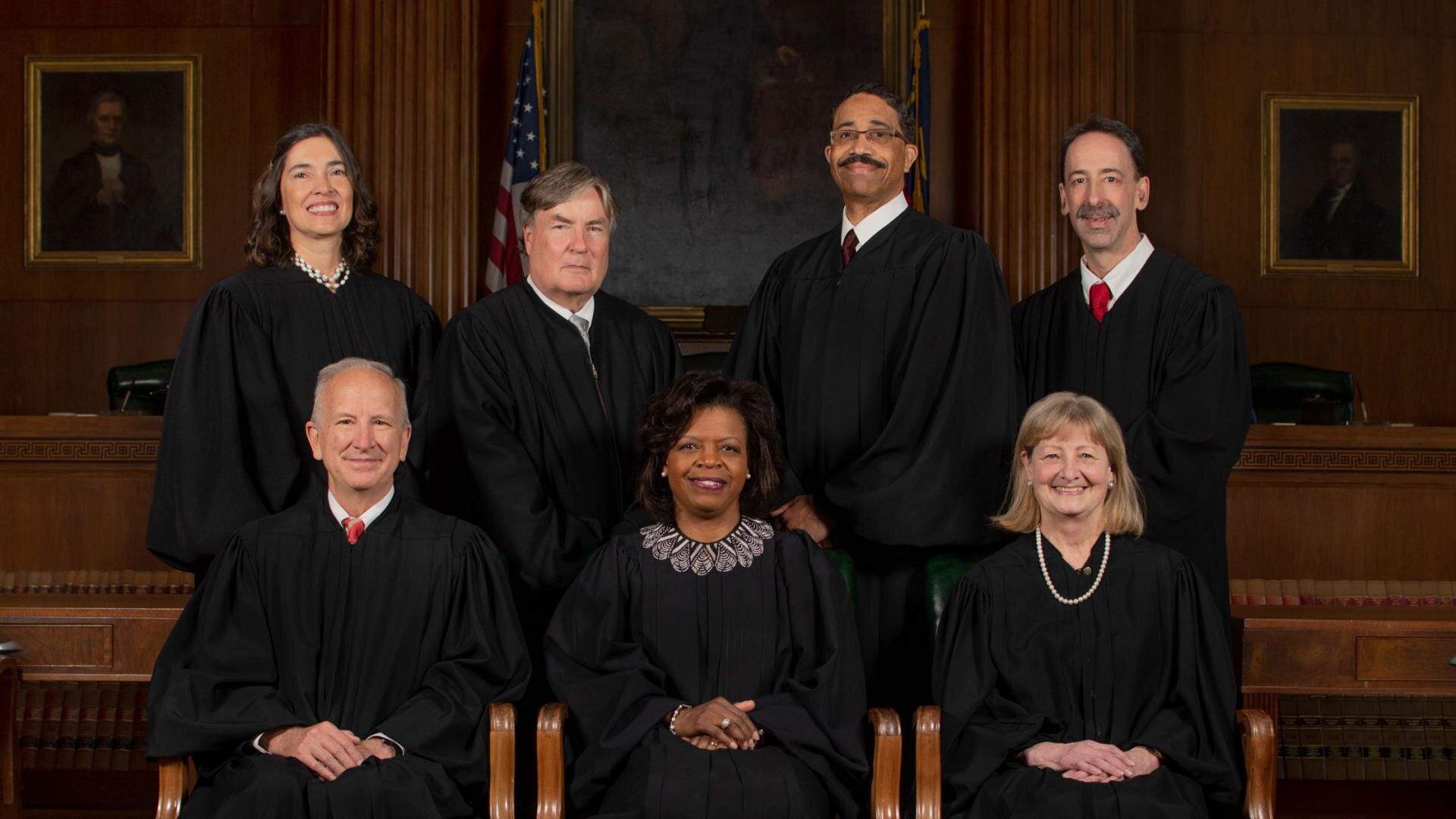Who are North Carolina’s New Supreme Court Justices?
The official portrait of the North Carolina Supreme Court will welcome two new faces in January. Source
In a year of tight races in North Carolina, three of the tightest came in the fight for seats on the North Carolina Supreme Court. The court is composed of seven members, serving staggered eight year terms, and serves as the final court of appeal for the state; it provides the final authoritative word on all matters of state law. Currently, the court is composed of six Democratic justices and one Republican justice—Justice Newby. Republican candidates hoped to chip away at that majority, in hopes that in 2022 when seats are next available they can flip the court to have a Republican majority.
The race for chief justice between Chief Justice Cheri Beasley (D) and Justice Paul Newby (R) ran down to the wire, and may still be subject to a recount as Justice Newby currently leads by fewer than 300 votes out of more than 5.3 million cast. Both Chief Justice Beasley and Justice Newby have long careers in public service. Beasley began her career in 1993 as a public defender before being appointed to a district court judgeship in 1999 by Governor Hunt. In 2008 she won a seat on the North Carolina Court of Appeals, and in 2012 she was appointed an associate justice on the state supreme court by Governor Perdue before being reelected in 2014. She was elevated by Governor Cooper to be chief justice in 2019, becoming the first African American to serve in the position. During her campaign she emphasized her commitment to modernizing the court system, increasing access to mental health and recovery courts, and increasing access to the courts. Justice Newby began practicing law in private practice in 1980, and began working in public service in 1985 when he joined the U.S. Attorney’s Office in Raleigh, where he remained until he joined the Supreme Court in 2004. He has been elected to two consecutive terms, and is the longest serving justice on the court with a 16 year tenure. Tradition dictates that the most senior justice on the court be elevated to become chief justice in the event of a vacancy—a tradition Governor Cooper broke with in his appointment of Chief Justice Beasley. Campaigning, Justice Newby emphasized a philosophy of judicial restraint and “tough but fair” justice.
Judge Phil Berger, Jr. (R), the son of North Carolina Senate Pro Tempore Phil Berger, won against Judge Lucy Inman (D) with a larger margin, outside of the range of a recount. Both Judges have careers in public service. Judge Berger began his career in private practice in 2001 before being elected the Rockingham County District Attorney from 2007 to 2016. He served as an Administrative Law Judge in 2016, and has served on the North Carolina Court of Appeals since 2017. During the campaign he, like Justice Newby, emphasized his belief in judicial restraint and opposition to “activist judges.” Justice Inman began her career as a law clerk to Chief Justice James Exum in 1990 and worked in private practice from 1992 to 2010. She was elected to a North Carolina Superior Court judgeship in 2010 and served in that role until she was elected to the North Carolina Court of Appeals in 2014 where she will continue to serve. In her campaign she articulated an adherence to a judicial philosophy of honest dedication to the rule of law that uses no one-size fits all rules.
Former State Senator Tamara Barringer (R) defeated incumbent Associate Justice Mark Davis (D) in the most decisive of the three races. Senator Barringer worked in private practice before being elected as the Senator from District 17, where she served three terms until 2018. She also has experience teaching on legal topics at the University of North Carolina’s Kenan Flagler Business School. In her campaign she emphasized a judicial philosophy of “strict Constitutional interpretation” in opposition to judicial activism. Justice Davis began his career in private practice in 1993, worked in the North Carolina Department of Justice from 2006 to 2011, and served as general counsel to Governor Perdue from 2011 to 2012. In 2012 he was appointed to the North Carolina Court of Appeals, where he was reelected in 2014. Governor Cooper appointed him to the seat vacated on the supreme court when Justice Beasley was elevated.
With all three seats going to Republicans, the court takes on a slightly more conservative bent. Four Democrats and three Republicans set the stage for competitive races in 2022, when two Democratically controlled seats and the majority come up for grabs.

